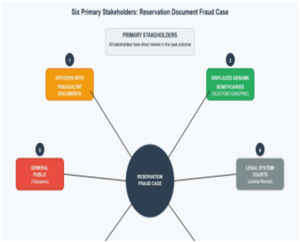Ethics Theory, TLP-UPSC Mains Answer Writing
Q. 1. As an officer in the Department of Personnel and Training (DoPT), you are part of a high-level panel tasked with reviewing the authenticity of reservation-related documents—such as those for SC, ST, OBC, EWS, and persons with disabilities—submitted by a number of civil servants at the time of their appointment. Recent audits have raised serious concerns regarding the legitimacy of some of these certificates. Many of the individuals under scrutiny have already been serving in various government departments for 5 to 10 years, with overall satisfactory performance records and no major disciplinary issues.
While legal action, including termination and prosecution, is being actively considered for those found guilty of submitting false documents, a parallel debate has emerged. Some experts and internal stakeholders argue that administrative leniency should be shown in cases where there was no clear malicious intent or where systemic lapses—such as inadequate verification mechanisms—enabled the breach.
However, rightful candidates who were displaced due to the fraudulent use of reserved category certificates are now demanding justice and restoration of their lost opportunities. Civil society groups and public interest litigants are also adding pressure, urging the government to take decisive, transparent, and equitable action. In this context, the government must walk a tightrope—balancing the legal and moral imperative to uphold fairness in public employment with the pragmatic challenges of dealing with long-serving officials who may have been products of an administrative failure.
Questions
- What are the ethical concerns involved in allowing or removing such officers from service?
- How can the principle of natural justice be upheld while ensuring fairness to genuine beneficiaries?
- What measures would you suggest to strengthen the verification of eligibility claims in public service recruitment. (250 words, 20 Marks)
Introduction
The DoPT is dealing with cases where officers may have used false reservation certificates to join service. This raises serious ethical, legal, and administrative issues involving fairness, systemic lapses, and the loss faced by genuinely eligible candidates.
Body
a. Ethical Concerns in Allowing or Removing Officers from Service
This issue involves tough ethical choices. It needs a balance between fairness to those already working and justice to the deserving candidates who lost their chance.
- Accountability vs. Compassion: Letting these officers continue may hurt the recruitment system and genuine candidates. But removing them may feel unfair if they didn’t act with bad intent.
- Precedent and Deterrence: Keeping them might encourage others to misuse the system. Strict action can stop misuse, but risks punishing those caught in official lapses.
- Justice to Displaced Candidates: Allowing ineligible officers to continue keeps injustice alive for genuine aspirants who lost their chance unfairly. This undermines the principle of equality of opportunity under Article 16(1) of the Constitution.
- Public Trust: Not acting firmly can weaken people’s faith in the system and in reservation policies ensured under Articles 15(4) and 16(4).
- Application of Rawls’ Theory of Justice: According to Rawls, social and economic inequalities are justified only if they benefit the least advantaged. Allowing undeserving individuals to occupy reserved positions violates this principle and harms the intended beneficiaries.
Hence, the ethical solution must protect both fairness and public trust. The system must be fair, but also humane.
Stake holders in this Case study


b. Upholding Natural Justice While Ensuring Fairness
Any action taken must follow natural justice. It should be fair to the officers, the displaced candidates, and the public interest.
- Right to Be Heard: Each officer must be allowed to explain their side before action is taken, aligning with the ‘audi alteram partem’ principle and Article 311 for procedural fairness in dismissal from civil services.
- Contextual Evaluation: Authorities must check if the mistake was deliberate or due to system failure.
- Proportionality of Punishment: Punishment should match the level of wrongdoing – fraud should be punished strongly, but small mistakes can be handled lightly. 4. Restorative Measures: If no fraud is found, options like letting the officer re-qualify in open category can be explored.
- Redressal for Genuine Candidates: Genuine candidates should be helped through special recruitment or fast-track appointments where possible, to restore the equality of opportunity guaranteed under Article 16(1).
Following fair procedures helps maintain justice and avoids harsh or careless decisions. c. Measures to Strengthen Verification of Eligibility Claims
To avoid such cases in the future, strong and clear systems must be put in place at all stages of recruitment.
- Centralized Digital Verification: Link reservation certificates to Aadhaar, Digilocker, or state databases for fast and real-time checks. For instance, Andhra Pradesh and Maharashtra have begun digitizing caste certificate databases to curb fraud.
- Pre-recruitment Scrutiny: Certificates must be checked by proper authorities before appointment or during probation. UPSC already mandates attestation by district magistrates for OBC claims – this can be expanded across services.
- Post-recruitment Audits: Do random checks on reservation-based hires to ensure the rules were followed. The CAG or independent panels can be tasked periodically with sample-based verification.
- Capacity Building: Train staff in spotting fake documents and following proper checks. Best practices from states like Karnataka (which uses QR-coded certificates) can be adopted centrally.
- Legal and Policy Reforms: Make laws stricter against fraud and set uniform rules for handling such issues. For example, the Central Government can consider a dedicated tribunal to address service-related document fraud cases for faster resolution.
Such reforms will make recruitment more honest and fair for everyone, upholding the spirit of Article 335, which balances reservation with administrative efficiency.
Conclusion
The situation calls for a balanced approach – one that punishes fraud, protects the rights of genuine candidates, and follows fair procedures. Improving verification and fair redressal can rebuild trust in the system.











